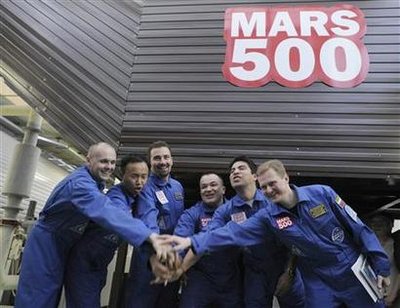莫斯科时间6月3日13时50分许,随着“火星-500”试验舱最后一道舱门缓缓关闭,来自中国、俄罗斯、法国和意大利的6名志愿者正式踏上长达520天的“火星之旅”,拉开人类首次全面模拟载人火星探测试验的帷幕。“火星-500”试验由俄罗斯联邦航天署、俄罗斯科学院及欧洲航天局等机构联合进行,旨在了解宇航员在未来前往火星过程中可能出现的心理和生理状态,为载人火星探测积累经验。试验舱位于莫斯科的生物医学研究所,除失重和辐射效果无法模拟外,其他条件均与国际空间站宇航员的生存环境相同。试验舱内的志愿者只能通过电子邮件与外界联系,而且会有40分钟的延迟,就像真正的火星之旅一样。此次试验是“火星-500”模拟试验的第三阶段,鉴于从飞船发射、飞向火星、着陆火星到返回地球,需要近500天时间,“火星-500”试验将持续520天。在此期间,6名志愿者的饮食起居将完全模拟太空生活,并体验飞往火星、着陆火星和返回地球的全过程。据了解,志愿者将用250天模拟飞往火星,30天模拟驻留火星,240天模拟返回地球。如试验顺利,他们将于2011年11月出舱。

|
 |
|
Participants of the Mars500 experiment, which simulates a 520-day flight to Mars, pose for a picture before entering a confinement module to start their mission in Moscow June 3, 2010. |
Clad in a blue jumpsuit and waving, crew member Sukhrob Kamolov quipped "See you in 520 days!" before hopping into sealed-off chambers Thursday with five other men taking part in a simulated trip to Mars.
To cheers and air kisses from their wives and relatives, three Russians, a Chinese man, a Frenchman and an Italian-Colombian entered the wood-paneled modules where they will live until November 2011, in an experiment to test how isolation affects people.
"So many experiments out there must be done for the first time, and this is what we are doing for Mars," Anatoly Grigoriev, vice president of the Russian Academy of Sciences, told reporters before the crew "departed."
But the European Space Agency (ESA) said it would be at least 30 years before humans could go to Mars, adding it would take up to nine months each way to reach it.
Unlike a real trip to the Red Planet, the crew on the record-breaking Mars500 simulated flight, housed in Moscow's Institute of Biomedical Problems, will have gravity and no exposure to radiation.
But as on a true Mars mission, there is an alcohol ban, no fresh air, vegetables must be grown on board and the only contact with Earth will be via e-mail, with a 40-minute delay.
"When I was a little boy I asked if I could go to Mars and I am now proud that I am part of making this one day happen," said Frenchman Romain Charles, who added he will bring along his guitar for entertainment.
Wang Yue, who had trained to be an astronaut in China, said he would learn Russian during the 520 days spent closeted away to communicate with the rest of the crew.
Though both English and Russian are official languages on the simulated trip, not everyone has a common tongue.
Led by Russian commander Alexei Sitev, the crew will live and work like astronauts from the $100-billion, 16-nation International Space Station (ISS), and they will split their time between experiments and exercise.
No one will be allowed in or out of the interlinking capsules, where the men -- who were picked out of almost 10,000 applicants and are aged between 27 and 38 -- will conduct dozens of psychological tests and live in six-meter squared bedrooms.
Thirty days will be spent camping on a red sand-covered Martian surface, lined with black rocks backlit by ruby and whose curved roof glistens with fake stars.
"HARDER FOR WOMEN IN ISOLATION"
Though over a thousand women applied for the venture -- which dictates "astronauts" must be under 185cm (6ft 1in) -- females are notably absent from the mission.
"It is harder for a woman to be taken out of life and put in isolation," said Mars500 project director Boris Morukov.
"The most important thing here is motivation, and limitations would upset women. You're not allowed to talk on a telephone," he added.
The crewmembers said they would miss women terribly during the simulated trip but that the sacrifice was worth it.
"It will be hard but I just try to recall all the great travelers who found the New World and who were also without their families," Sitev said.
Last year four Russians, one German and a Frenchman successfully completed a 105-day simulated space trip at the same institute.
相关阅读
(Agencies)

(中国日报网英语点津 Helen 编辑)